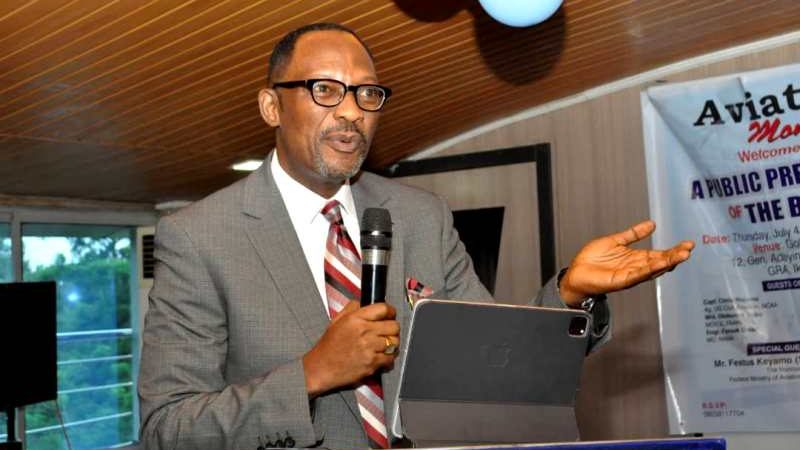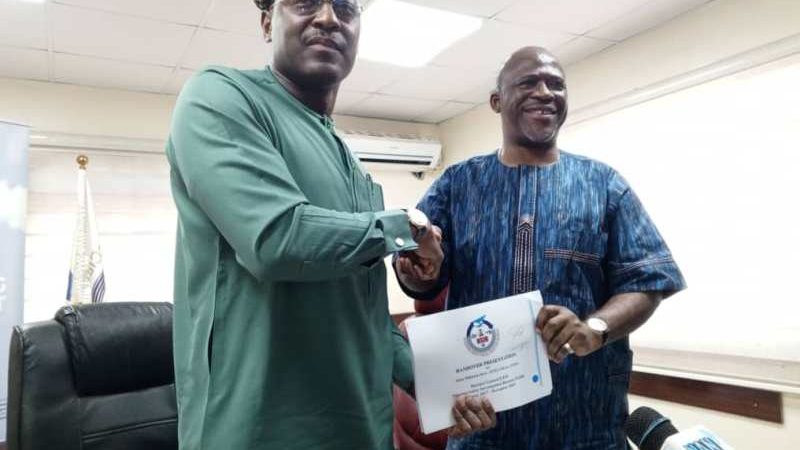The Viability Of State Owned Airports: Issues, Challenges, The Way Forward
Stakeholders in Nigeria’s transport sector rose up from a webinar on September 12, 2023 with a resolution that there is need to review the proliferation of state owned airports in Nigeria and seek solutions to their non-viability.
Declaring open the webinar of the 2nd National Transport Technology Conference & Exhibition 2023, the 4th Pre-Event Conversation Series on Air Transport organized by the Nigerian Transport Commissioners’ Forum, the Permanent Secretary, Federal Ministry of Aviation & Aerospace Development, Dr. Emmanuel Meribole said state airports are critical gateways that bridge regions and continents.
“It is very important that we maximize efficiency and profitability of state owned airports if we want to get the best out of them,” he said.
In his contribution, the Secretary General of Aviation Safety Round Table Initiative (ASRTI), Mr. Olu Ohunayo commended states that have appointed commissioners to take care of the aviation sector saying that this indicates their commitment to enhancing the sector. He posited that no airport is built from the beginning to make profit and that airports are built initially for essential services.
Considering the increasing trend of state governments building airports and eventually handing them over to the Federal Airports Authority of Nigeria (FAAN), he called on the Nigerian Civil Aviation Authority (NCAA) to create opportunities for a new set of commercial airlines with certain categories of aircraft for certain categories of airports.
The Director General, Civil Aviation, Nigeria Civil Aviation Authority (NCAA), Capt. Musa Nuhu said the increasing number of state owned and unviable airports has become a burden to Nigeria’s aviation agencies, noting that out of 32 airports in Nigeria, four are viable.
The Managing Director of Anambra State Airport, Mr. Martins Nwafor said the airport initiative was well thought out, having the second longest runway in the country that is 3.7kilometres, adding that the airport handles over 100,000 passengers per annum.
Wole Shadare, a journalist said he had a research report few years ago, indicating that over N320 billion had been invested so far by Nigeria’s state governments in airport projects. He advised state governments to seek methods of partnership with the private sector to make the airports viable.
The President of National Association of Nigeria Travel Agents (NANTA), Mrs. Susan Akporiaye said there is a need to begin to perceive airports as business centres and run them as businesses since “no business person will open a store in an airport that has just one flight per week.”
“Opening an airport just to add it to your curriculum vitae as a Governor should not be the case. We need to start looking at regions, collaborations. Think wider and consider the economics, level of commercialization of your state. If you know it will work, call other Governors in that region and discuss and collaborate as states” said Akporiaye.
She further stated that “the challenges of state owned airports can be overcome even though they are enormous. Let them go back and work out a sustainability and maintenance plan. There must be maintenance as part of the viability plan. Maintenance should be part of planning of an airport. Even if it is viable, if maintenance is not in the plan, it’s a matter of time.”
She also said that the absence of fire trucks at Port-Harcourt International Airport has restrained international airlines from operating into the airport.
The representative of Chartered Institute of Transport Administrators (CIOTA), Prof. Samuel Odewumi stressed the need for politicians to appoint professionals to help them with decision making. “Commissioners should appoint professionals in each segment of transport and professionalize the ministries” he said.
The Managing Director of Centre for Promotion of Private Enterprises, Dr. Muda Yusuf in his presentation, said most of the state owned airports that were established as cargo airports had deviated from the primary objectives of setting them up because they lacked cargo to pursue this objective while some other states are establishing airports because road transportation is becoming very unsafe and so, they are not looking at economic viability in their considerations for establishment. “So, air travel has become the safest means of transport. This has led to a surge in air travel,” he said.
Yusuf said having over 20 airports in Nigeria is not out of place if the right things are done considering the fact that countries like Ethiopia has 53 airports and South Africa has 90 airports most of which are viable airports. Yusuf identified the risks to viability of the airports as the absence of good business model to support the airports being created, poor management of the airports, the weak capacity of states to support their airports financially, high regulatory charges and the size of the airports that are bigger than what the states can support.
“The Federal Ministry of Aviation’s interference in the management of the airports creates a limited space to manage the airports professionally,” he added.
On the solution to the challenge, Yusuf said “where there is right business model, they can be viable but we need to create the environment for that to happen” adding that the challenges of road travel is an opportunity for viability of the airports.
State-owned airports should be designated for smaller aircraft. It will be more effective to manage.
Concessioning options should be considered for most of the state airports. It will allow for an infusion of superior entrepreneurial thinking in the management.
There should be regional approach to the pursuit of viability. There should be seamless connectivity between the states so that contiguous states can use a single airport.
Earlier in her welcome address, the Commissioner for Transport, Anambra State, Barrister Patricia Igwebuike asserted that “connectivity and mobility is the way forward in the new world.”





